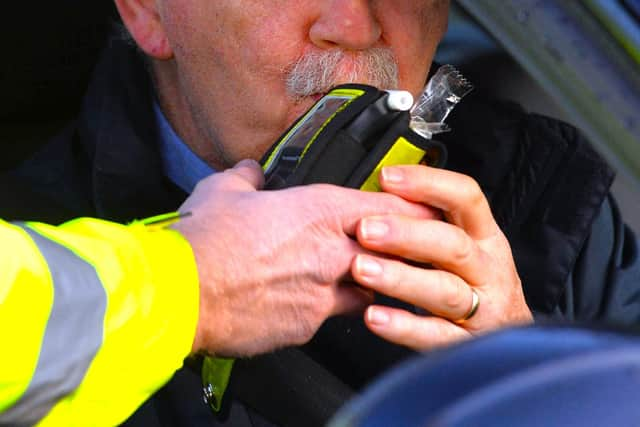Judges savage Northern Irish legal team behind drink-driving European Convention on Human Rights claim saying that the case was 'entirely devoid of merit'
and live on Freeview channel 276
Charles McDonagh had invoked the European Convention on Human Rights (ECHR) after getting caught over the limit in Enniskillen.
In rejecting his challenge, the two judges had some withering criticism for his lawyers, saying the case had been "misconceived from the outset" and marked by "a repeated failure on the part of the applicant’s legal representatives to engage and co-operate satisfactorily with the court".
Advertisement
Hide AdAdvertisement
Hide AdThe challenge to his conviction was taken using legal aid, but the amount involved is unknown.


When asked, the Department of Justice said that it didn't know, and even if it did, it might not release the information anyway.
Asked why any legal aid had been given to support such a flawed case, it said it would not comment on individual cases.
-
SAGA BEGINS WITH WOBBLY STEPS:
The saga began on December 19, 2020, when Mr McDonagh was seen by police parking his car at the entrance to a shop in Enniskillen "in a manner which partially blocked two petrol pumps".
Advertisement
Hide AdAdvertisement
Hide AdIt was 4.10 in the morning, and when Mr McDonagh got out of the car he was unsteady on his feet.
Police approached him, smelled alcohol, and breath-tested him.
He did two tests: one which came back at 58mcg, and another that came back at 43mg.
The legal limit is 35mcg.
He was taken to Omagh Police Station and charged with driving with excess alcohol.
Advertisement
Hide AdAdvertisement
Hide AdHe denied the offence, but on April 11, 2022 he was convicted at Omagh Magistrates’ Court.
Then on September 2, 2022, Mr McDonagh's solicitor was granted civil legal aid to apply for a judicial review.
A ruling on this application was then handed down on December 12 last year.
The written judgement was handed down by Justice McCloskey on behalf of both him and Justice Horner, and it listed Mr McDonagh's solicitor as Oliver Roche and his barristers as Ronan Lavery KC and Kelly Doherty.
-
'FUNDAMENTALLY DEFECTIVE':
The judges rubbished the entire basis for the case.
Advertisement
Hide AdAdvertisement
Hide AdFor example, Mr McDonagh's lawyers said Articles 6 and 8 of the ECHR had been breached (the right to a far trial, and the right to privacy) by Section 6 of the Road Traffic Act.
Article 6 of the ECHR is the right to a fair trial, and Article 8 is the right to privacy.
Meanwhile Section 6 of the Road Traffic Act act says that if two breath samples are given, the lower of the two should be used.
Mr McDonagh's legal team suggested that the results of breath tests are “arbitrary” and there is “no evidence” that modern machines are better than their predecessors.
Advertisement
Hide AdAdvertisement
Hide Ad"What has any of the foregoing got to do with the right lying at the core of Article 6 ECHR, namely the right of every accused person to a fair trial?" said the judges in response.
Then they turned to a claim by Mr McDonagh's lawyers that there was an "inequality of arms" in the case (meaning a difference in resources available to defence and prosecution elements of the case).
This claim, said the judges, was "unevidenced" and was "light years removed" from the laws they were invoking anyway.
Other arguments they made were dismissed as having "no traction", showing an "absence of any evidential foundation", and being "manifestly detached" from the laws upon which they relied, with the judges also pointing out grammatical errors in the legal team's submissions.
Advertisement
Hide AdAdvertisement
Hide AdIn addition, the application for a judicial review fell outside the deadline.
But in seeking to explain the delay, Mr McDonagh's solicitor had submitted a "fundamentally defective document" which "manifestly fails in any event to establish even a semblance of any basis for the exercise of the court’s discretion to extend time".
In summary, the judges found the case "entirely devoid of merit", said it had been "misconceived from the outset", and was marked by "a repeated failure on the part of the applicant’s legal representatives to engage and co-operate satisfactorily with the court, in manifest disregard of case management orders and the overriding objective".
-
'UNACCEPTABLE, MISCONCEIVED, AND IRRELEVANT':
Among the things the judges complained of was a failure of the legal team to show up to a hearing last November.
Advertisement
Hide AdAdvertisement
Hide AdMr Justice McCloskey said that, one day before the hearing, the court got an email from Mr McDonagh's solicitor saying no-one would be there because “members of the legal profession practising in the field of criminal law will be withdrawing their services tomorrow... across all criminal courts”.
Mr Justice McCloskey pointed out: "This is the King’s Bench Division of the High Court. The High Court is not a criminal court."
He said the legal team had demonstrated "deliberate obstruction of, and non – cooperation with, the court", adding: "This is quite intolerable…
"The court does not accept that it was in any way appropriate for no member of the applicant’s legal team to attend…
Advertisement
Hide AdAdvertisement
Hide Ad"The excuse put forward is a combination of the unacceptable, the misconceived and the irrelevant."
Given all of the above, in an unusual move Mr Justice McCloskey and Mr Justice Horner ruled against Mr McDonagh for costs.